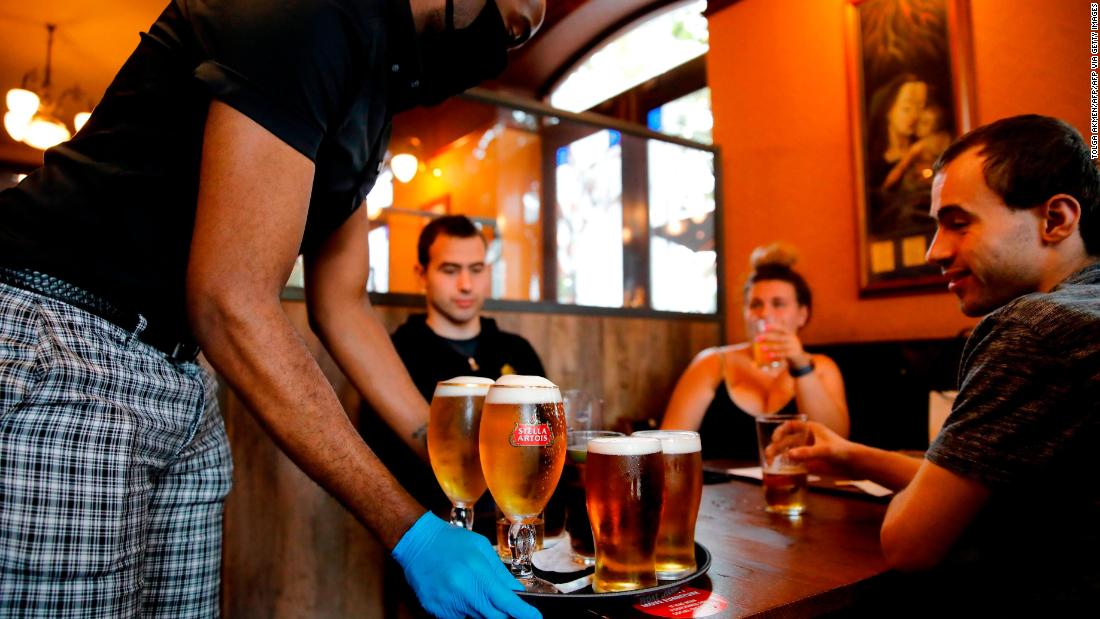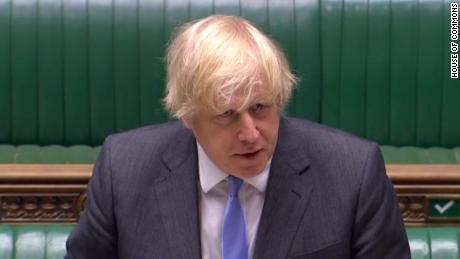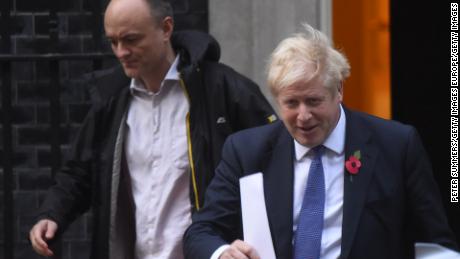English pubs are reopening. Here’s what it’s like
For the writer Samuel Johnson, there was “nothing which has yet been contrived by man, by which so much happiness is produced as by a good tavern.” And the sentiment was captured by Shakespeare, too: a character in “Henry V” wishes he were “in an alehouse in London,” reasoning: “I would give all my fame for a pot of ale and safety.”
Pubs are the beating heart of Britain, as vital a national institution as The Bard’s writings themselves. But for the first time since World War II, ale and safety have become mutually exclusive commodities — and millions have been locked out of their locals since mid-March as a result.
“I’ve missed going to the pub with my mates, as any British person would,” says Akwasi Akoto, 25. But England finally returned to the pub on Saturday, the first day of the country’s latest, most significant easing of lockdown restrictions. Those in Scotland, Northern Ireland and Wales must wait longer to return to their local.
But if the first pints pulled in months represent a national celebration, it’s a muted and awkward one. The experience looks very different: social distancing is mandatory and only table service is allowed, so the typical sight of punters wedged shoulder-to-shoulder at the bar after work remains a pre-pandemic memory.

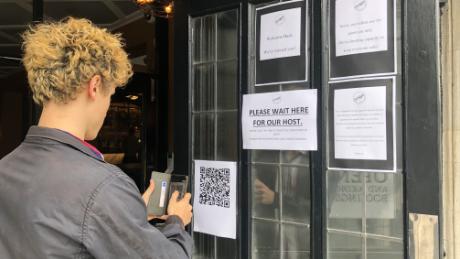
A drinker scans a QR code in order to enter contact-tracing details before entering a south London pub.
And despite a growing ambivalence towards the lockdown in recent weeks, concerns about public health remain in the country that suffered Europe’s most deadly Covid-19 outbreak. Even in the UK’s beer gardens, many are angry about how their country got its coronavirus response so wrong.
“What makes it so almost dystopian is that the staff are wearing such heavy PPE just to bring you a drink,” Akoto, who filed through the doors of a London pub shortly after 10 a.m., tells CNN. “It feels a bit self-indulgent and a bit selfish — I felt selfish being there.” For the thousands who placed an order on Saturday, many more stayed away.
But the day marked something of a catharsis for others, and the mood was jovial among those who did cross the threshold into their favorite taverns. “I wanted a slice of normality,” says Craig Sartwright, explaining his decision to venture into a pub in Clapham, south London, where he pointedly keeps his distance from other drinkers.
“I definitely feel people have missed the pubs, especially some of the most vulnerable in our society,” adds Owen Reed, a staff member at a Wetherspoons pub in Bedworth, central London. “Many of our customers are older, and sometimes have no close family and friends.
“Them coming into the pub to see us is sometimes the only human contact they will have all day, or longer.”
‘This is all very worrying’
As with everything else, drinking in the age of coronavirus feels different.
Customers at pubs across the country were asked for contact details before they could enter, in order to help with Covid-19 contact-tracing should someone subsequently test positive. In many establishments, plastic screens were set up and glasses were swapped out for disposable cups.
“We have tried in our efforts not to make the pub too clinical and utterly joyless,” the Southampton Arms in north London told its customers. And most significantly for the landlords across the country whose finances have been hit by the pandemic, venues were running significantly under capacity.
But despite the industry’s best attempts, it was almost inevitable that the day of re-opening — dubbed “Super Saturday” — would be tense.
“At 10:30 there was a guy riding his electric scooter in Spoons,” Akoto says, referring to the wildly popular, low-cost chain Wetherspoons that is affectionately known by its nickname by many Brits. “The crazy cranky people that you associate with British pubs, I’m sure wherever there are they’re rubbing their hands with glee to be able to get on it.” The chain has been criticized for its treatment of its staff during the pandemic, and for its owner’s opposition to the lockdown.

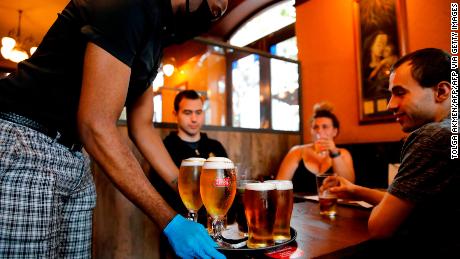
A member of staff serves customers at a pub in Stratford, east London.
Britain’s pubs haven’t been forced to shut en masse in living memory, and closing time was a painful process for landlords, staff and drinkers alike — leading to concerns that a country with such an entrenched drinking culture would overdo it on Saturday.
“We haven’t been out the month in three months essentially, we’ve been isolating. This is really the first time that we’ve been able to come out,” Bianca, a resident of Clapham, south London, tells CNN outside an O’Neills pub. “I’m worried that not everyone has the same attitude as us.”
“I don’t think everyone is that sensible,” adds Phil Crossan. “There’ll be people who will stay out all night now.”
Those concerns prompted Boris Johnson to hold a Friday afternoon press conference in which he urged restraint — but many questioned whether a Saturday opening was wise, and plenty of institutions decided to ignore it altogether.
“It’s our belief that the government are ignoring the advice that science is telling us,” the Tollington Arms in north London told its customers on Twitter, announcing its decision to stay closed for now. “We cannot in good conscience open the pub when contracting a deadly virus is still possible under these guidelines.”
The Twelve Taps, in the southeast England town of Whitstable, added: “We do not think we can implement social distancing in our bar, and given the fact that people are still dying from this virus, nothing we have read convinces us that it is the right thing to do to encourage people into a small space,” it said.
“This is all very worrying and quite maddening,” the pub added. “We don’t think the government’s advice for the public and for hospitality businesses has been clear.”
“It’s earlier than I would have thought they’d be open,” Sartwright adds.
Other landlords, meanwhile, were waiting with baited breath for the chance to welcome customers.
‘People have started to give up’
It’s always been true that the quickest way to understand Britain is by going to its pubs. And in many taverns around the country, Britain is angry.
“It’s devastating,” says Bianca, who declined to provide her last name. “I’ve found it quite hard because my family’s from Australia,” she adds. “Seeing how the UK has handled (the pandemic) has made me panic.”

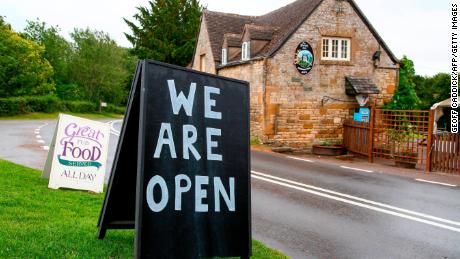
The Plough Inn in Ford, central England welcomes drinkers for the first time in almost four months.
“I think Dominic Cummings was the turning point,” Bianca says. “The lockdown definitely benefits the upper class of society and I think Cummings highlighted that — he can do what he wants.” Johnson has always denied that his aide broke the UK’s lockdown restrictions.
Pubs in England re-opened alongside a slew of other businesses on Saturday, and restrictions on public meetings and indoor gatherings were also relaxed.
But Britain’s crawl towards normality hasn’t been easy; the city of Leicester was sent back into lockdown days earlier due to a localized outbreak, and other regions are being monitored as cases tick back up.
“As times gone on, people have started to give up a bit,” says Crossan. “We started strong but maintaining it and keeping the morale was lost along the way,” adds Akoto.
“My friends and I are in the habit of meeting up in parks now, and the weather’s nice — so I definitely won’t be going to the pub again soon.”
![]()


